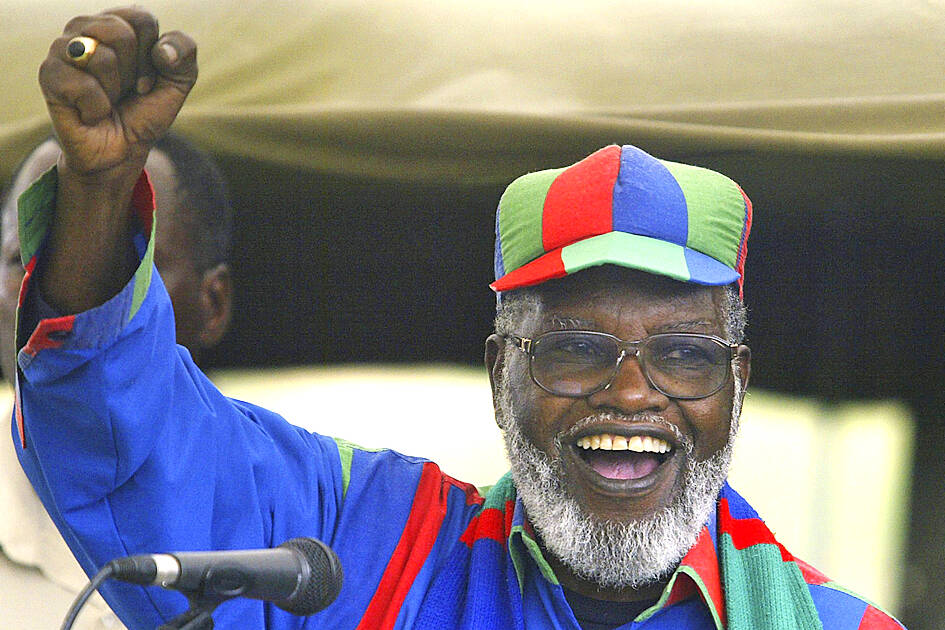Sam Nujoma, the activist and guerrilla leader who became Namibia’s first democratically elected president after it won its independence from apartheid South Africa, died aged 95 on Saturday, the Namibian Presidency said yesterday.
Nujoma rose to head the thinly populated southern African country on March 21, 1990, and was formally recognized as “Founding Father of the Namibian Nation” through a 2005 act of parliament.
The acclaim was balanced out by domestic and international criticism over his intolerance of critical media coverage, his railing against homosexuality and over the 1998 constitutional amendment that let him run for a third term.

Photo: AP
He was a longtime ally of former Zimbabwean president Robert Mugabe, backing Mugabe’s land seizures from white farmers, although at home Nujoma stuck to a “willing buyer, willing seller” policy.
“The foundations of the Republic of Namibia have been shaken,” the presidency wrote on X. “Our venerable leader, Dr. Nujoma did not only blaze the trail to freedom — but he also inspired us to rise to our feet and to become masters of this vast land of our ancestors.”
Nujoma had been hospitalized for medical treatment over the past three weeks it said, adding that “unfortunately, this time, the most gallant son of our land could not recover from his illness.”
Nujoma served his three terms as president from 1990 to 2005 and sought to project himself as a unifying leader bridging political divides.
In a country scarred by the legacy of apartheid and German colonial rule, Nujoma’s South West Africa People’s Organisation (SWAPO) party oversaw a national reconciliation program under the motto “One Namibia, One Nation.”
In his speeches, Nujoma made a point of repeating the phrase “A united people, striving to achieve a common good for all members of the society, will always emerge victorious.”
His achievements included establishing democratic institutions and prioritizing reconciliation, said Ndumba Kamwanyah, a lecturer at the University of Namibia and a political analyst.
However, his autocratic tendencies, on display in his treatment of the media and brutal suppression of the 1999 Caprivi rebellion, cast a shadow over his legacy, Kamwanyah added.
“While Nujoma’s presidency was foundational in establishing Namibia’s independence and governance, it was not without flaws,” he said.
Nujoma was born in a village in northwestern Namibia in 1929, when his country was under South African administration. South Africa had controlled Namibia since World War I after a brutal few decades of German colonial rule remembered for the genocide of the Herero and Nama people.
As a boy he looked after his family’s cattle and attended a Finnish mission school, before moving to the coastal town of Walvis Bay and then the capital, Windhoek, where he worked for South African Railways, a biography posted on the Web site of Nujoma’s charitable foundation said.
In the late 1950s he became leader of the Owambo People’s Organisation, a precursor to liberation movement SWAPO, organizing resistance to the forced relocation of black people in Windhoek that culminated in police killing 12 unarmed people and wounding dozens more.
Nujoma was charged with organizing the resistance and arrested. In 1960, he went into exile. He traveled across Africa before reaching the US, where he petitioned the UN for Namibia’s independence.
Made SWAPO leader in absentia, Nujoma established its armed wing and in 1966 launched a guerrilla war against the apartheid government.
It took more than a decade of pressure from Nujoma and others before a UN Security Council resolution in 1978 proposed a ceasefire and elections, and another decade for the ceasefire deal to be signed and elections held in late 1989.
SWAPO won a majority in those elections, and Nujoma took office in March the following year.

ANGER: A video shared online showed residents in a neighborhood confronting the national security minister, attempting to drag her toward floodwaters Argentina’s port city of Bahia Blanca has been “destroyed” after being pummeled by a year’s worth of rain in a matter of hours, killing 13 and driving hundreds from their homes, authorities said on Saturday. Two young girls — reportedly aged four and one — were missing after possibly being swept away by floodwaters in the wake of Friday’s storm. The deluge left hospital rooms underwater, turned neighborhoods into islands and cut electricity to swaths of the city. Argentine Minister of National Security Patricia Bullrich said Bahia Blanca was “destroyed.” The death toll rose to 13 on Saturday, up from 10 on Friday, authorities

Local officials from Russia’s ruling party have caused controversy by presenting mothers of soldiers killed in Ukraine with gifts of meat grinders, an appliance widely used to describe Russia’s brutal tactics on the front line. The United Russia party in the northern Murmansk region posted photographs on social media showing officials smiling as they visited bereaved mothers with gifts of flowers and boxed meat grinders for International Women’s Day on Saturday, which is widely celebrated in Russia. The post included a message thanking the “dear moms” for their “strength of spirit and the love you put into bringing up your sons.” It

DEBT BREAK: Friedrich Merz has vowed to do ‘whatever it takes’ to free up more money for defense and infrastructure at a time of growing geopolitical uncertainty Germany’s likely next leader Friedrich Merz was set yesterday to defend his unprecedented plans to massively ramp up defense and infrastructure spending in the Bundestag as lawmakers begin debating the proposals. Merz unveiled the plans last week, vowing his center-right Christian Democratic Union (CDU)/Christian Social Union (CSU) bloc and the center-left Social Democratic Party (SPD) — in talks to form a coalition after last month’s elections — would quickly push them through before the end of the current legislature. Fraying Europe-US ties under US President Donald Trump have fueled calls for Germany, long dependent on the US security umbrella, to quickly

In front of a secluded temple in southwestern China, Duan Ruru skillfully executes a series of chops and strikes, practicing kung fu techniques she has spent a decade mastering. Chinese martial arts have long been considered a male-dominated sphere, but a cohort of Generation Z women like Duan is challenging that assumption and generating publicity for their particular school of kung fu. “Since I was little, I’ve had a love for martial arts... I thought that girls learning martial arts was super swaggy,” Duan, 23, said. The ancient Emei school where she trains in the mountains of China’s Sichuan Province